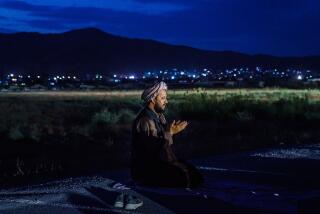Kuwaitis Are Not ‘Gung-Ho’ for War : Outlook: A senior minister says the exile government would prefer to wait for the embargo to take its toll.
- Share via
LONDON — A senior minister in the deposed Kuwaiti government declared Friday that Kuwait’s royal family does not favor war as the first means of liberating his country.
Sheik Ali al Khalifa al Sabah, the Kuwaiti finance minister, told reporters that the exile government has enough wealth to maintain itself “for a very long time.”
“We are not gung-ho for war, we never were and never will be,” Ali said, pointing out that in war “our citizens would be the first ones to be killed.”
The leadership in exile would prefer to wait for the U.N. embargo against Iraq to tighten and force Iraq to back down, he said during a rare appearance at the Foreign Press Assn.
“The embargo is having an effect, and it will continue to have an effect,” he added. “The industrial sector in Iraq is already almost paralyzed, and the army is losing spare parts.”
Ali, who continues to control Kuwaiti investments estimated at $100 billion, indicated that his government can continue to be solvent at least as long as that of Iraqi President Saddam Hussein. He declined to disclose the value of Kuwait’s assets abroad.
He praised the governments and international institutions that have cooperated with the government in exile. Although Kuwait’s assets were frozen by the United States, Britain, Japan and other nations to prevent Iraq from absorbing them after its annexation of Kuwait, most central banks have relaxed those orders to give the exile government a measure of latitude with its investments.
“It’s probably the richest government in exile in modern history,” a banking source said. “If the sanctions against Iraq hold, I have no doubt that they can outlast Saddam Hussein. After all, they don’t even have a country to run at the moment.”
What the exile leadership does have is commitments. In addition to continuing payments on short-term debts, the Kuwaitis have committed about $5 billion over the next three or four months to help finance the military buildup in the gulf region and soften the economic impact on the countries most severely affected.
Ali conceded that, with or without war, his government will face a huge task of reconstruction when the crisis is over.
“It is going to be a tough reconstruction program,” he said, “and a tough healing program for our people. But we do not shrink from that challenge, either as a government or as a people.”
Referring to reports of the looting in Kuwait by Iraqi troops, Ali said they have “strengthened our resolve.”
Several times, he criticized Jordan’s King Hussein, who has traveled through the Middle East and North Africa in an effort to broker “an Arab solution” to the Kuwaiti problem.
“There is nothing called an Arab solution,” Ali said. “There is no halfway, and there is no room for mediators to come up with a bright idea.”
Ali was asked whether a prolonged stalemate, accompanied by Iraq’s colonization activity, will not simply erase Kuwait from the map. He conceded that his people “are trying to live as long as possible in Kuwait” and finding it increasingly difficult, but insisted that most Kuwaitis will return after it is liberated.
“There will always be a Kuwait,” he said.
More to Read
Sign up for Essential California
The most important California stories and recommendations in your inbox every morning.
You may occasionally receive promotional content from the Los Angeles Times.













